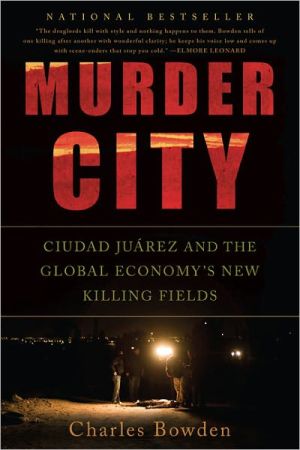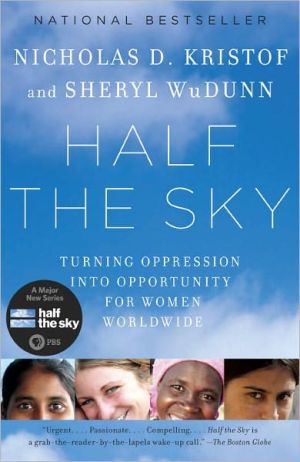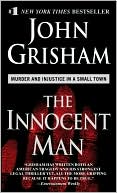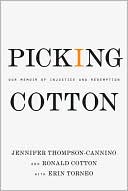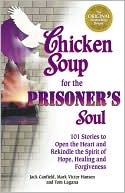Murder City: Ciudad Juarez and the Global Economy's New Killing Fields
Ciudad Juárez lies just across the Rio Grande from El Paso, Texas. A once-thriving border town, it now resembles a failed state. Infamously known as the place where women disappear, its murder rate exceeds that of Baghdad. Last year 1,607 people were killed—a number that is on pace to increase in 2009.\ In Murder City, Charles Bowden—one of the few journalists who has spent extended periods of time in Juárez—has written an extraordinary account of what happens when a city disintegrates....
Search in google:
From the award-winning, critically acclaimed Charles Bowden, a stunning work of reportage on Ciudad Juárez—the blood-soaked town caught in the crosshairs of Mexico’s escalating drug wars Publishers Weekly Bowden (Some of the Dead Are Still Breathing) grapples with the almost incomprehensible levels of violence in Juárez, Mexico. Over 1,600 people were murdered in Juárez in 2008; almost as many were murdered in the first half of 2009 and countless more have been kidnapped. Bowden tries to explain the escalation in violence, but explanation—even investigation—is impossible: witnesses don't come forward out of fear of the police; the police in turn are terrified of the military and the cartels. The military are apathetic and often complicit in the killing, as is the federal government. Journalists report the scantiest facts; many are paid off, and the rest fear the consequences of telling the truth. In the absence of hard facts, Bowden can offer only an impressionistic account of his own frustration at the collusion of police, media, federal government, and global economic forces in making inexorable violence the defining feature of daily life in the border town. This is a nonfiction book without facts, without a thesis, and without an argument; Bowden's sentences are gorgeous things, euphonious and deeply sincere—but the book offers no understanding or call to action, only resigned acceptance. (Apr.)
\ Publishers WeeklyBowden (Some of the Dead Are Still Breathing) grapples with the almost incomprehensible levels of violence in Juárez, Mexico. Over 1,600 people were murdered in Juárez in 2008; almost as many were murdered in the first half of 2009 and countless more have been kidnapped. Bowden tries to explain the escalation in violence, but explanation—even investigation—is impossible: witnesses don't come forward out of fear of the police; the police in turn are terrified of the military and the cartels. The military are apathetic and often complicit in the killing, as is the federal government. Journalists report the scantiest facts; many are paid off, and the rest fear the consequences of telling the truth. In the absence of hard facts, Bowden can offer only an impressionistic account of his own frustration at the collusion of police, media, federal government, and global economic forces in making inexorable violence the defining feature of daily life in the border town. This is a nonfiction book without facts, without a thesis, and without an argument; Bowden's sentences are gorgeous things, euphonious and deeply sincere—but the book offers no understanding or call to action, only resigned acceptance. (Apr.)\ \ \ \ \ Kirkus ReviewsGQ and Mother Jones contributing editor Bowden (Some of the Dead Are Still Breathing: Living in the Future, 2009, etc.) digs into the complexities behind the ominous escalation of violence in Ciudad Juarez, a city across the border from El Paso that now has the tragic distinction of being the most dangerous city in the world. In 2006, shortly after his controversial election, Mexican President Felipe Calderon, whom half of the nation considers illegitimate, declared war on the region's drug cartels. He sent thousands of federal troops to Juarez's state of Chihuahua, vowing to hunt down the leaders of the major drug distributors. At the same time, women in Juarez began to disappear, and their decomposing bodies began turning up in shallow graves in the desert. The disturbing trend was echoed by a simultaneous increase in rape and domestic violence in all of Juarez's social strata. For the city's unskilled labor force, the primary alternative to the drug business is a job in a maquila, whose ultra-low wages assure manufacturers from El Norte cheap production of goods for the global economy. Add to the mix a local police force willing to sell its guns to the highest bidder, and you have the makings of a potentially viral social disaster. Bowden began following the murders in March 2008. Before long, they outpaced his ability to contextualize them. Were they all drug-related? How many were committed for revenge or just the thrill of it by killers taking advantage of the growing lawlessness? Were the cartels behind them, or the police? Or the army, charged with restoring order? Straightforward answers elude the author, as they do nearly every observer-the city's journalists, who are challengedto report on crimes without inciting killers to come after them; the social workers who deal with the human detritus who survive the violence; even a reformed sicario (assassin) who can only lovingly relate the gruesome details of his former craft but is clueless about who ordered his services or why. Bowden uses his tremendous talents to tell a haunting, darkly poetic story of a city's horrifying descent into madness and anarchy. A potent book that readers won't soon forget, and a warning of what can come of an insatiable market that knows no borders.\ \ \ Library JournalIn 2008, more than 1600 people were murdered in Juarez, Mexico, killings most often attributed to the drug cartels and the drug war. According to Bowden (Some of the Dead Are Still Breathing), that approach is too simplistic. He argues that Juarez is a dying city—dying under the weight of a broken system in which almost half of the economy is fueled by the drug trade, the police either work for the cartels or rarely leave the relative safety of their station houses, the army preys on the guilty and the innocent, and no one seems to be in charge. Bowden even admits that he, and thus his narrative, is overburdened by the sheer enormity of the problems in Juarez. The result is a deeply troubling glimpse at human misery. VERDICT For readers looking for traditional coverage of the issues in Juarez, this is not your book. But Bowden's prose (and at times poetry) has a way of stabbing at the soul, making this the book for anyone who wants to get underneath the truth and into the heart of the matter.—Mike Miller, Austin P.L., TX\ \
